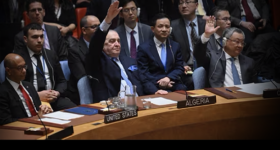 Andrew McKillop
Andrew McKillop
21st Century Wire
THE SAUDI-ISRAELI NEXUS
Alongside Gulf state leaderships and their official news outlets, Israel’s Benyamin Netanyahu reacted with fury to the Iran nuclear sanctions-unwinding deal made in Geneva, 24 November. He fulminated:
“What was concluded in Geneva last night is not a historic agreement, it’s a historic mistake,” adding “It’s not made the world a safer place. Like the agreement with North Korea in 2005, this agreement has made the world a much more dangerous place”.
Here’s the kicker: it’s not so much nuclear, but unclear is what Israel and Saudi Arabia intend to do next…

After his failure in Syria, John Kerry is busy playing butler for Saudi Oil moguls.
Their loyal sherpah at the Geneva talkfest, France’s foreign minister, Laurent Fabius, threw in the towel on trying to get a blanket rejection of Iranian offers, in his tireless attempts to scupper the deal. France has major arms selling contracts with the Wahabite Kingdom, an Islamic feudal theocracy – where females persons are not even allowed to drive a car. Protecting the Wahabites from nuclear Iran is a noble quest. France also has legacy guilt for its World War II treatment of Jews, by its Vichy regime which collaborated throughout the war as a servile pawn of the Nazis, and France casts itself as a kneejerk glove puppet ally for Israeli aggression in the Middle East. However and despite that, the talks in Geneva had enough momentum to result in a concrete deal.
Sanctions relief under the agreement is estimated by US officials as likely to provide Tehran about $6 to $7 billion in badly needed foreign-exchange earnings during the next six months, which the accord says will be a trial period. If Tehran does not hold to its commitments, the White House said in a press release, new and more powerful sanctions, as well as existing sanction will be imposed or reintroduced to cripple Iran. In the short-term, analysts estimate, Tehran may quickly obtain about $4 billion, through unfrozen earnings from oil sales previously trapped in overseas bank accounts by the sanctions and not remitted to Iran. To allay the predicted outburst of criticism in both the US Senate and Congress from the friends of Israel or the enemies of Iran, the White House made it plain that the US intends to go on hurting Iran.
Its press release said the country would still lose around $25 billion in oil revenues during the six-month confidence-building phase and about $15 billion of its oil revenues will remain frozen in banks outside of Iran at the end of the trial period.
SPINNING CENTRIFUGES AND KEEPING OIL HIGH
The U.S. and its European partners in the historic deal will also suspend bans on trade in petrochemicals, precious metals, automobiles and airplane spare parts, and further extend previously existing, but small humanitarian relief operations, and student funding exemptions for Iranians abroad. More important for the global economy, the White House press release brags that sanctions affecting crude oil sales have cut Iran’s oil sales from 2.5 million barrels per day (Mbd) in early 2012 to 1 Mbd today, “causing an estimate earnings loss of more than $80 billion since January 2012 that Iran will never be able to recoup”. The press release also says the EU will maintain its own ban on crude oil from Iran, and Iranian oil sales in Europe will be capped at about 1 Mbd, resulting in continuing lost oil revenues estimated at about 3 billion euros ($4 billion) per month, throughout the trial phase
The White House, in its long detailed press release on the Geneva agreement, anticipates and makes a clear attempt to head off criticism that the deal is ‘too lenient’, which among its five partners at the talks were most intense from the French. For weeks in France its government-owned TV channels and its government-owned radio stations have drummed the “message” that military force, that is bombing Iran, is the only option. The harsh and shrill propaganda coming from the French government recurringly focused the role of Iran’s centrifuges and its Arak heavy water reactor “able to produce a bomb within 18 months”. France’s large recent arms sales contracts with Riyadh, and what the Wahabite Kingdom expects in return were never mentioned. Also missing from French glove puppet media accounts of French hawk policy on Iran, the goal of keeping oil prices high… was absent!
For China, Russia and Germany, the +1 player in the 5 + 1 sextet negotiating with Iran in Geneva, the deal was a lot simpler. They hailed the November 24 deal as a pure and simple breakthrough. While Russia, the equal-rank largest oil producer in the world with Saudi Arabia, may lose from an expected decline in world oil prices, other members of the sextet, except France, openly welcomed the outlook for Iranian oil to flow more freely. French President Francois Hollande in an e-mail statement from his office, November 24, was forced to claim that he: “Welcomed the conclusion of the Geneva negotiations on Iran’s nuclear program”, also asserting for his national audience that it was France’s tough stance that had nailed the Iranian snake. He said: “The accord that was reached respects the demands imposed by France on…..uranium storage and enrichment, suspension of new facilities, and international control”.
Hollande quickly went on to say he wanted to “normalize relations” with Iran, after wanting to bomb it only a few weeks earlier, if only to get France a place in the queue for oil contracts, that analysts concluded would rapidly grow. The Wall Street Journal, 25 November, reported that several European companies had already announced, by last Sunday evening, that they were preparing to resume operations in Iran.
SELLING THE DEAL
The US White House in its own way hailed the November 24 agreement with Iran, giving a huge list of technical details on how the agreement will “go on hurting Iran’s nuclear program”. Its long and uber-arrogant press release focused many of the technical subjects, and it parried the expected criticism from the Paris-Riyadh-Jerusalem axis that Iran would soon be able to crank up its oil sales – hurting Riyadh if not Paris and Jerusalem.
Iran’s centrifuges must turn slower and less. The agreement even limits the number of centrifuge rotors, cages and bearings Iran will be able to produce and possess. Incredible.
Iran must also cease all reprocessing of nuclear wastes inside the country – and hand the job – and the lucrative contracts for spent fuel transport and reprocessing to the very short list of countries able to do it. Top of the list of course are the three amigos – France, UK, and USA, followed by the Russians, and the Chinese. Business as usual.
One carefully unpublished, but certain goal of the Iran nuclear negotiations circus is to maintain high oil prices, to the delight of Goldman Sachs, US shale oil producers, Saudi Arabia and its Gulf state friends – and major oil companies including France’s Total Oil SA. Few if no other interest groups directly profit from overpriced oil. To what extent oil prices can be held at present overpriced highs is however uncertain. Market reaction and response in coming days and weeks will tell us.
To be sure, the real linkage of overpriced oil – and centrifuges spinning overground or underground in Iran – is almost zero. But the use of oil sanctions against Iran makes the relation ultra clear. Iran has to choose between national atomic kudos, and selling oil. The financial and revenue links exist, but the Geneva accord was very careful to not spell out the rate at which Iran will rejoin the “community of oil exporters” , because the faster Iran does this, the faster oil prices will drop.
Inside Iran, although given little or no coverage by western media, the same argument has raged – national kudos versus importing food, machinery, spare parts and general merchandise on the back of oil revenues. In Tehran, Sunday evening, car drivers honked their horns and flashed their lights because ordinary Iranians saw the Geneva deal as a breakthrough. They celebrated the deal as a political victory for President Hasan Rouhani and a step towards relieving Iran’s failing economy. Not only outside Iran, but also inside, the nuclear program is criticised as a major waste of national funds – not a stepping stone to proudly possessing atomic weapons like those produced and owned by Israel and those owned and produced by Pakistan – for immediate supply to Saudi Arabia whenever the Wahabite Kingdom opens its giant petrodollar-fattened chequebook.
ANTIQUE MILITARY AND CIVIL NUCLEAR
According to France’s president Hollande, reacting to the collapse of his foreign minister’s attempts to keep Iran bombing on the agenda, by scuppering any deal in Geneva, the Iranian heavy water reactor in Arak was the red line in the sand. Stopping this HW reactor, for the French political class and its sycophantic media was tantamount to stopping the claimed and supposed Iranian nuclear weapons program dead in its tracks.
French consumers of pap media were invited and told to believe that Iranian possession of a heavy water reactor signalled the same thing as the 1980s Pakistani atom bomb program of Abdul Qadr “Bombs R Us” Khan, facilitated and enabled by the Canadian-supplied CANDU heavy water and depleted uranium (HW and DU) 137 megawatt KANUPP reactor – which was supplied, in fact almost given to Pakistan in 1964. Iranians, French were supposed to imagine, live in a time warp making them totally unable to develop their own HW DU reactor technology, and assuming firstly that they wanted to “brew” bomb grade plutonium from depleted uranium source material, like Pakistan did. And like India did well before Pakistan, in 1974.
The technology is antique. Nuclear weapons have moved on since the 1960s and 1970s. One uber-simple example is DU munitions and military ordnance, which need no centrifuges or plutonium or enriched uranium. Another is “quick and dirty” low cost nuclear weapons only using nuclear waste, the most irradiated and chemically toxic possible. No bang, but plenty of damage for the buck.
Nothing in the White House press release of November 24, 2013 would suggest we are talking about 40 or 50-year-old technology, well-known by at least two or even three generations of nuclear and military scientists, worldwide. Pakistan’s “heavy water route” atom bombs date from the 1980s. In 1945, in southern Germany, Nobel prize physicist Werner Heisenberg was still trying to produce a Nazi atom bomb using the HW DU reactor route when Allied soldiers stormed his secret bunker lab! It was bombed out by the Allies using regular-type explosives. The Nazis lost the war.
Atom bombs are antique tech. The Iranian nuclear sanctions show or circus endured so long that it was upstaged and sidelined by reality. Since the time that US-initiated and US-funded nuclear technology started being developed by Iran – from 1955 – the world has had two massive nuclear disasters, Chernobyl and Fukushima. For nuclear lobby diehards, of course, this does not destroy the pride, prestige and satisfaction that possessing nuclear power bestows, but the sheer costs of nuclear power are getting to be known – and not enjoyed.
For Iran’s mullahs, perhaps, scaling back the country’s national nuclear program might be a big loss of face, but nuclear power, and weapons are a gadget for the elite whether it concerns poor or rich countries.
READ MORE ON NUCLEAR ENERGY AT: 21st Century Wire Nuclear Files















